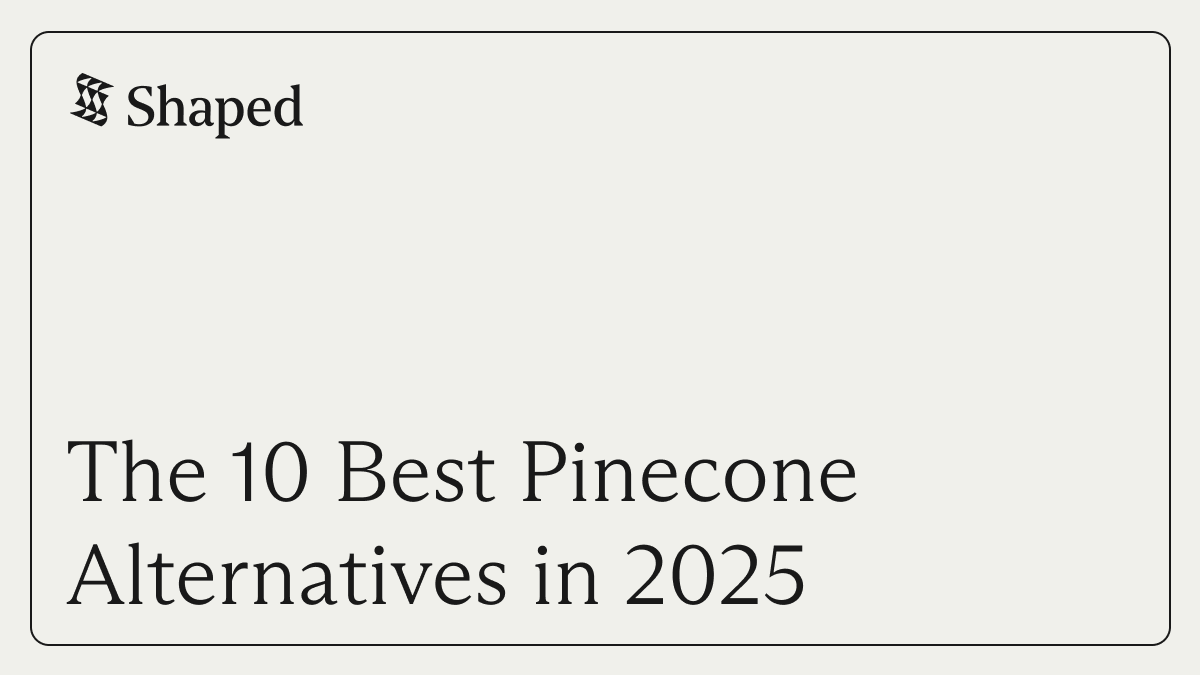1. Shaped
Unlike pure vector databases, Shaped is an end-to-end recommendation API that goes beyond retrieval. It combines semantic search, personalization, and ranking into one platform.
- Why it’s a Pinecone alternative: Instead of stitching together Pinecone for retrieval plus custom ranking models, Shaped handles the entire personalization pipeline.
- Key strengths:
- Built-in multi-objective ranking
- Handles the cold start problem
- Unified API for feeds, search, and recommendations
- Optimized for real-time personalization
- Best for: Teams who want production-ready feeds and search without managing infrastructure.
2. Weaviate
Weaviate is an open-source vector database with strong developer adoption. It supports hybrid search (text + vector), modular plug-ins, and integrates easily with LLMs.
- Why it’s a Pinecone alternative: Weaviate offers flexibility with open-source plus a managed cloud.
- Trade-offs: Requires more setup than Pinecone; ranking must be built separately.
- Best for: Teams that want open-source control with modern semantic search.
3. Qdrant
Qdrant is a high-performance vector database with a focus on reliability and scalability.
- Why it’s a Pinecone alternative: Similar functionality, but often more cost-effective.
- Strengths: Strong filtering support, built-in distributed deployments.
- Best for: Engineering teams seeking speed and control at lower cost.
4. Milvus
Milvus is a widely used open-source vector database that has been around since before Pinecone. It is supported by Zilliz.
- Why it’s a Pinecone alternative: Mature, large ecosystem, and works well for high-volume retrieval.
- Trade-offs: Complex deployment and tuning compared to managed services.
- Best for: Large enterprises with infrastructure capacity.
5. Vespa
Vespa is a search and recommendation engine originally developed at Yahoo. It supports vector search, hybrid retrieval, and real-time personalization.
- Why it’s a Pinecone alternative: Vespa goes beyond just vector storage, including features closer to Shaped’s ranking layer.
- Best for: Enterprises needing advanced search at scale.
6. Redis Vector Search
Redis added vector similarity search capabilities to its popular in-memory database.
- Why it’s a Pinecone alternative: If you already use Redis, you can avoid adding another system.
- Trade-offs: Less feature-rich for ML workloads compared to dedicated vector DBs.
- Best for: Teams who want lightweight vector search without adopting a new database.
7. Chroma
Chroma is an open-source embedding database focused on LLM workflows.
- Why it’s a Pinecone alternative: Lightweight, simple to use, integrates tightly with LLM apps.
- Best for: Prototyping AI apps with a smaller scale.
8. FAISS
FAISS is Facebook AI’s open-source similarity search library.
- Why it’s a Pinecone alternative: Industry standard for research and custom pipelines.
- Trade-offs: Library only, not a database — requires more engineering effort.
- Best for: Research and custom infrastructure teams.
9. Annoy
Annoy, built by Spotify, is a library for approximate nearest neighbor search.
- Why it’s a Pinecone alternative: Extremely fast and lightweight for specific ANN workloads.
- Best for: Simpler or smaller-scale recommendation/search systems.
10. Elastic + OpenSearch
Both Elastic and OpenSearch have added vector search on top of their search stacks.
- Why it’s a Pinecone alternative: If you already run Elastic/OpenSearch, vector features come “for free.”
- Best for: Teams extending an existing ElasticSearch-style deployment.
Conclusion
Pinecone remains a strong choice for vector search. But depending on your use case, alternatives may be more cost-effective, customizable, or complete.
- If you want end-to-end personalization, choose Shaped.
- If you want open-source flexibility, try Weaviate, Qdrant, or Milvus.
- If you already use existing infra, Redis or Elastic may be enough.
In 2025, the ecosystem is rich — but only Shaped combines semantic search with ranking and personalization, making it the most future-proof Pinecone alternative.
FAQs About Pinecone Alternatives
Q1: Why look for Pinecone alternatives?
Cost, flexibility, and feature needs often drive teams to explore other vector databases or recommendation APIs.
Q2: Which Pinecone alternative is best for startups?
Shaped is ideal since it handles retrieval, ranking, and personalization without requiring a full ML team.
Q3: Which alternative scales to millions of vectors?
Milvus, Qdrant, and Weaviate all handle large-scale deployments.
Q4: Can I replace Pinecone with Redis or Elastic?
Yes, but those are general-purpose databases with vector extensions. They may not match dedicated performance.
Q5: Is Shaped a vector database?
Not exactly. Shaped is a recommendation API that integrates vector search with ranking and personalization — making it more powerful than a raw database.




